Business Ethics Portfolio: Disney, Origin Energy Scandals Analysis
VerifiedAdded on 2023/03/29
|11
|2887
|326
Portfolio
AI Summary
This portfolio provides an in-depth analysis of the ethical practices of The Walt Disney Company and Origin Energy. For Disney, it highlights the company's commitment to corporate social responsibility (CSR), environmental sustainability, and ethical employee treatment, focusing on volunteerism as a key ethical initiative. In contrast, the portfolio examines Origin Energy's questionable safety practices, particularly regarding coal seam gas wells leakage, and the reasons behind their unethical behavior, including cost considerations and regulatory non-compliance. It also discusses the consequences of these practices for both the business and society, emphasizing environmental pollution and health risks. Furthermore, the portfolio identifies Sally McDow as the whistle-blower who exposed Origin Energy's wrongdoings, detailing her actions, the information she provided, and the repercussions she faced, as well as the consequences for the company. Finally, it describes Starbucks' tax avoidance scandal in the UK, highlighting the negative impact on the company's image and reputation. This portfolio offers a comprehensive overview of ethical considerations in business, contrasting ethical and unethical behaviors and their impacts on various stakeholders.
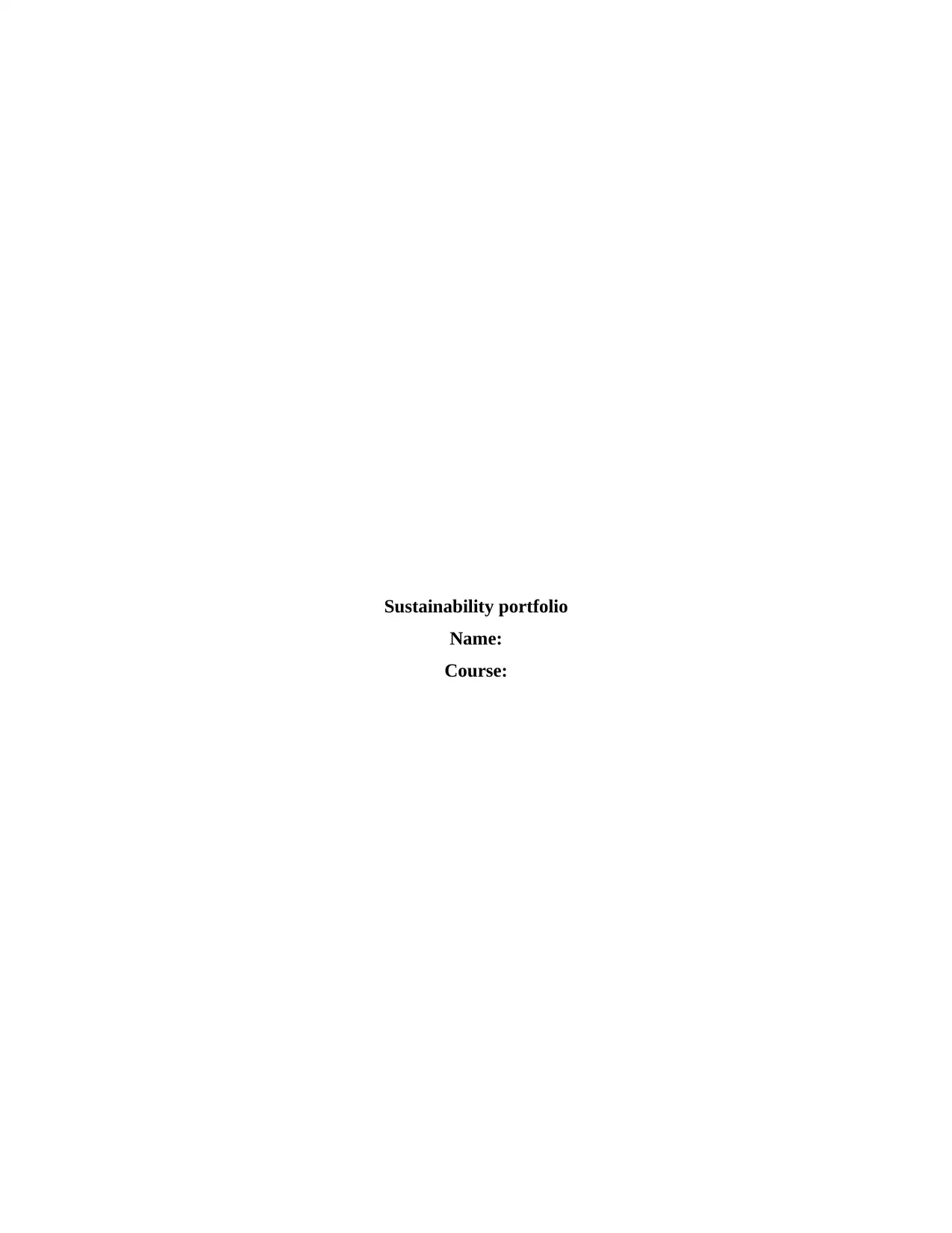
Sustainability portfolio
Name:
Course:
Name:
Course:
Paraphrase This Document
Need a fresh take? Get an instant paraphrase of this document with our AI Paraphraser
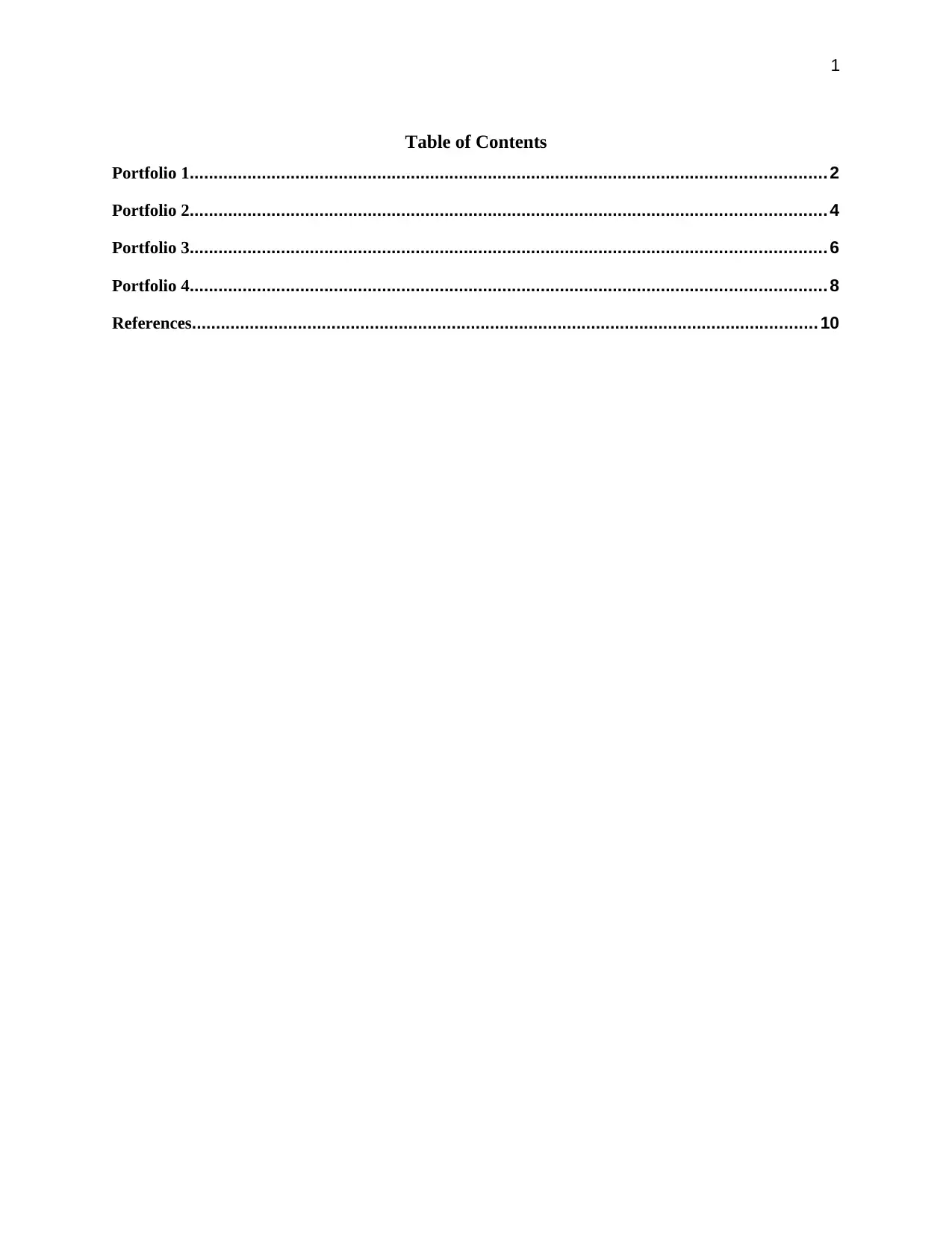
1
Table of Contents
Portfolio 1.................................................................................................................................... 2
Portfolio 2.................................................................................................................................... 4
Portfolio 3.................................................................................................................................... 6
Portfolio 4.................................................................................................................................... 8
References.................................................................................................................................. 10
Table of Contents
Portfolio 1.................................................................................................................................... 2
Portfolio 2.................................................................................................................................... 4
Portfolio 3.................................................................................................................................... 6
Portfolio 4.................................................................................................................................... 8
References.................................................................................................................................. 10
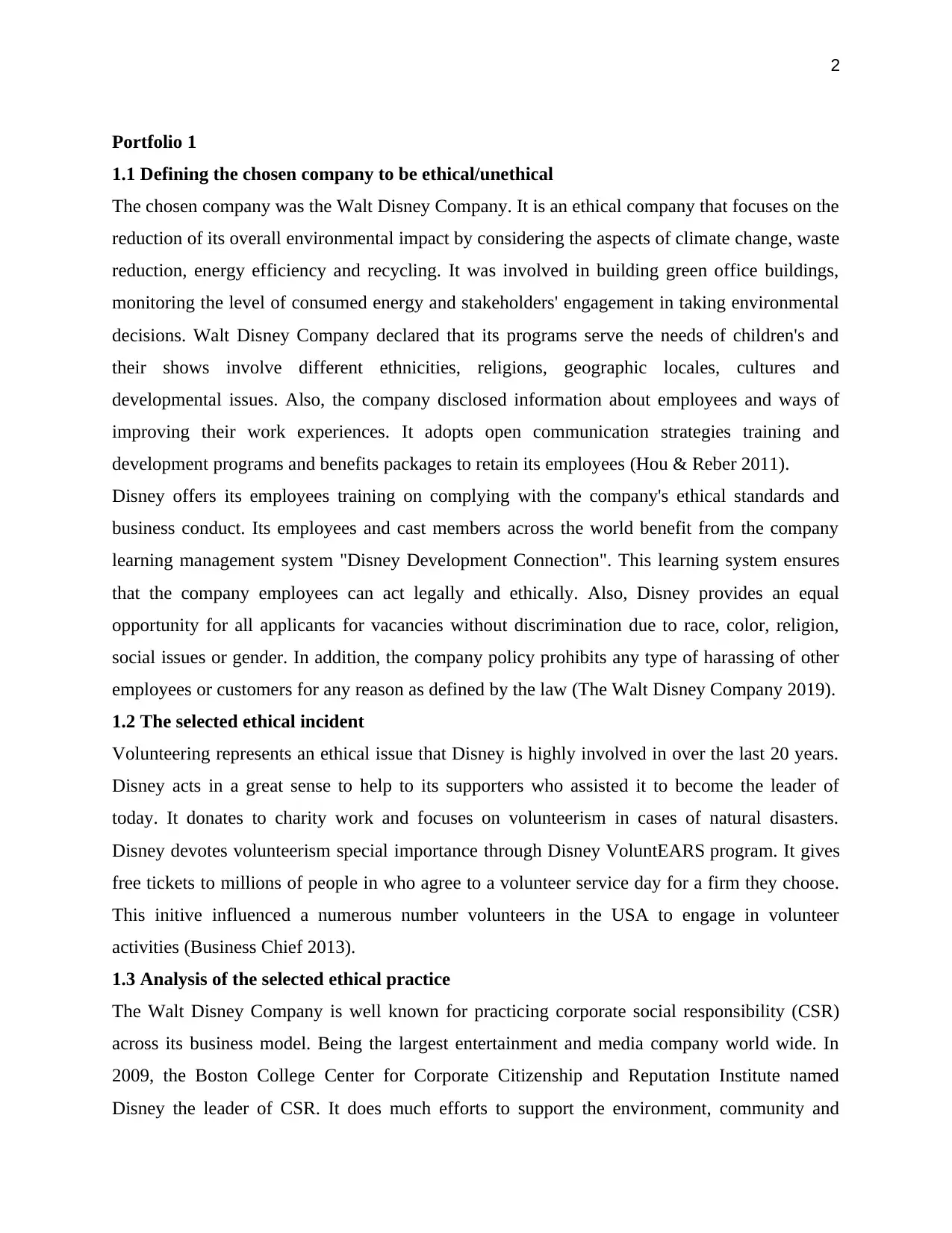
2
Portfolio 1
1.1 Defining the chosen company to be ethical/unethical
The chosen company was the Walt Disney Company. It is an ethical company that focuses on the
reduction of its overall environmental impact by considering the aspects of climate change, waste
reduction, energy efficiency and recycling. It was involved in building green office buildings,
monitoring the level of consumed energy and stakeholders' engagement in taking environmental
decisions. Walt Disney Company declared that its programs serve the needs of children's and
their shows involve different ethnicities, religions, geographic locales, cultures and
developmental issues. Also, the company disclosed information about employees and ways of
improving their work experiences. It adopts open communication strategies training and
development programs and benefits packages to retain its employees (Hou & Reber 2011).
Disney offers its employees training on complying with the company's ethical standards and
business conduct. Its employees and cast members across the world benefit from the company
learning management system "Disney Development Connection". This learning system ensures
that the company employees can act legally and ethically. Also, Disney provides an equal
opportunity for all applicants for vacancies without discrimination due to race, color, religion,
social issues or gender. In addition, the company policy prohibits any type of harassing of other
employees or customers for any reason as defined by the law (The Walt Disney Company 2019).
1.2 The selected ethical incident
Volunteering represents an ethical issue that Disney is highly involved in over the last 20 years.
Disney acts in a great sense to help to its supporters who assisted it to become the leader of
today. It donates to charity work and focuses on volunteerism in cases of natural disasters.
Disney devotes volunteerism special importance through Disney VoluntEARS program. It gives
free tickets to millions of people in who agree to a volunteer service day for a firm they choose.
This initive influenced a numerous number volunteers in the USA to engage in volunteer
activities (Business Chief 2013).
1.3 Analysis of the selected ethical practice
The Walt Disney Company is well known for practicing corporate social responsibility (CSR)
across its business model. Being the largest entertainment and media company world wide. In
2009, the Boston College Center for Corporate Citizenship and Reputation Institute named
Disney the leader of CSR. It does much efforts to support the environment, community and
Portfolio 1
1.1 Defining the chosen company to be ethical/unethical
The chosen company was the Walt Disney Company. It is an ethical company that focuses on the
reduction of its overall environmental impact by considering the aspects of climate change, waste
reduction, energy efficiency and recycling. It was involved in building green office buildings,
monitoring the level of consumed energy and stakeholders' engagement in taking environmental
decisions. Walt Disney Company declared that its programs serve the needs of children's and
their shows involve different ethnicities, religions, geographic locales, cultures and
developmental issues. Also, the company disclosed information about employees and ways of
improving their work experiences. It adopts open communication strategies training and
development programs and benefits packages to retain its employees (Hou & Reber 2011).
Disney offers its employees training on complying with the company's ethical standards and
business conduct. Its employees and cast members across the world benefit from the company
learning management system "Disney Development Connection". This learning system ensures
that the company employees can act legally and ethically. Also, Disney provides an equal
opportunity for all applicants for vacancies without discrimination due to race, color, religion,
social issues or gender. In addition, the company policy prohibits any type of harassing of other
employees or customers for any reason as defined by the law (The Walt Disney Company 2019).
1.2 The selected ethical incident
Volunteering represents an ethical issue that Disney is highly involved in over the last 20 years.
Disney acts in a great sense to help to its supporters who assisted it to become the leader of
today. It donates to charity work and focuses on volunteerism in cases of natural disasters.
Disney devotes volunteerism special importance through Disney VoluntEARS program. It gives
free tickets to millions of people in who agree to a volunteer service day for a firm they choose.
This initive influenced a numerous number volunteers in the USA to engage in volunteer
activities (Business Chief 2013).
1.3 Analysis of the selected ethical practice
The Walt Disney Company is well known for practicing corporate social responsibility (CSR)
across its business model. Being the largest entertainment and media company world wide. In
2009, the Boston College Center for Corporate Citizenship and Reputation Institute named
Disney the leader of CSR. It does much efforts to support the environment, community and
⊘ This is a preview!⊘
Do you want full access?
Subscribe today to unlock all pages.

Trusted by 1+ million students worldwide
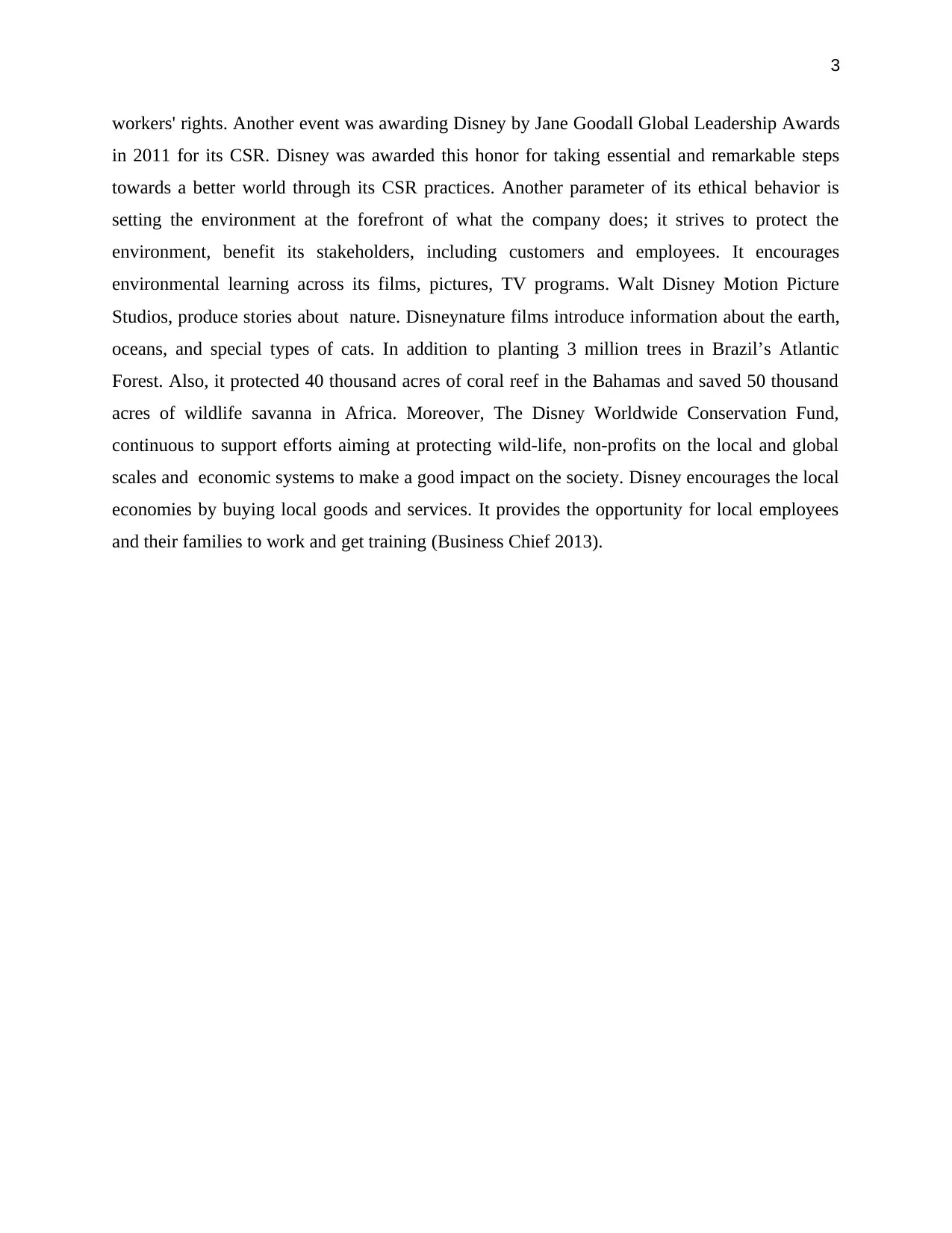
3
workers' rights. Another event was awarding Disney by Jane Goodall Global Leadership Awards
in 2011 for its CSR. Disney was awarded this honor for taking essential and remarkable steps
towards a better world through its CSR practices. Another parameter of its ethical behavior is
setting the environment at the forefront of what the company does; it strives to protect the
environment, benefit its stakeholders, including customers and employees. It encourages
environmental learning across its films, pictures, TV programs. Walt Disney Motion Picture
Studios, produce stories about nature. Disneynature films introduce information about the earth,
oceans, and special types of cats. In addition to planting 3 million trees in Brazil’s Atlantic
Forest. Also, it protected 40 thousand acres of coral reef in the Bahamas and saved 50 thousand
acres of wildlife savanna in Africa. Moreover, The Disney Worldwide Conservation Fund,
continuous to support efforts aiming at protecting wild-life, non-profits on the local and global
scales and economic systems to make a good impact on the society. Disney encourages the local
economies by buying local goods and services. It provides the opportunity for local employees
and their families to work and get training (Business Chief 2013).
workers' rights. Another event was awarding Disney by Jane Goodall Global Leadership Awards
in 2011 for its CSR. Disney was awarded this honor for taking essential and remarkable steps
towards a better world through its CSR practices. Another parameter of its ethical behavior is
setting the environment at the forefront of what the company does; it strives to protect the
environment, benefit its stakeholders, including customers and employees. It encourages
environmental learning across its films, pictures, TV programs. Walt Disney Motion Picture
Studios, produce stories about nature. Disneynature films introduce information about the earth,
oceans, and special types of cats. In addition to planting 3 million trees in Brazil’s Atlantic
Forest. Also, it protected 40 thousand acres of coral reef in the Bahamas and saved 50 thousand
acres of wildlife savanna in Africa. Moreover, The Disney Worldwide Conservation Fund,
continuous to support efforts aiming at protecting wild-life, non-profits on the local and global
scales and economic systems to make a good impact on the society. Disney encourages the local
economies by buying local goods and services. It provides the opportunity for local employees
and their families to work and get training (Business Chief 2013).
Paraphrase This Document
Need a fresh take? Get an instant paraphrase of this document with our AI Paraphraser
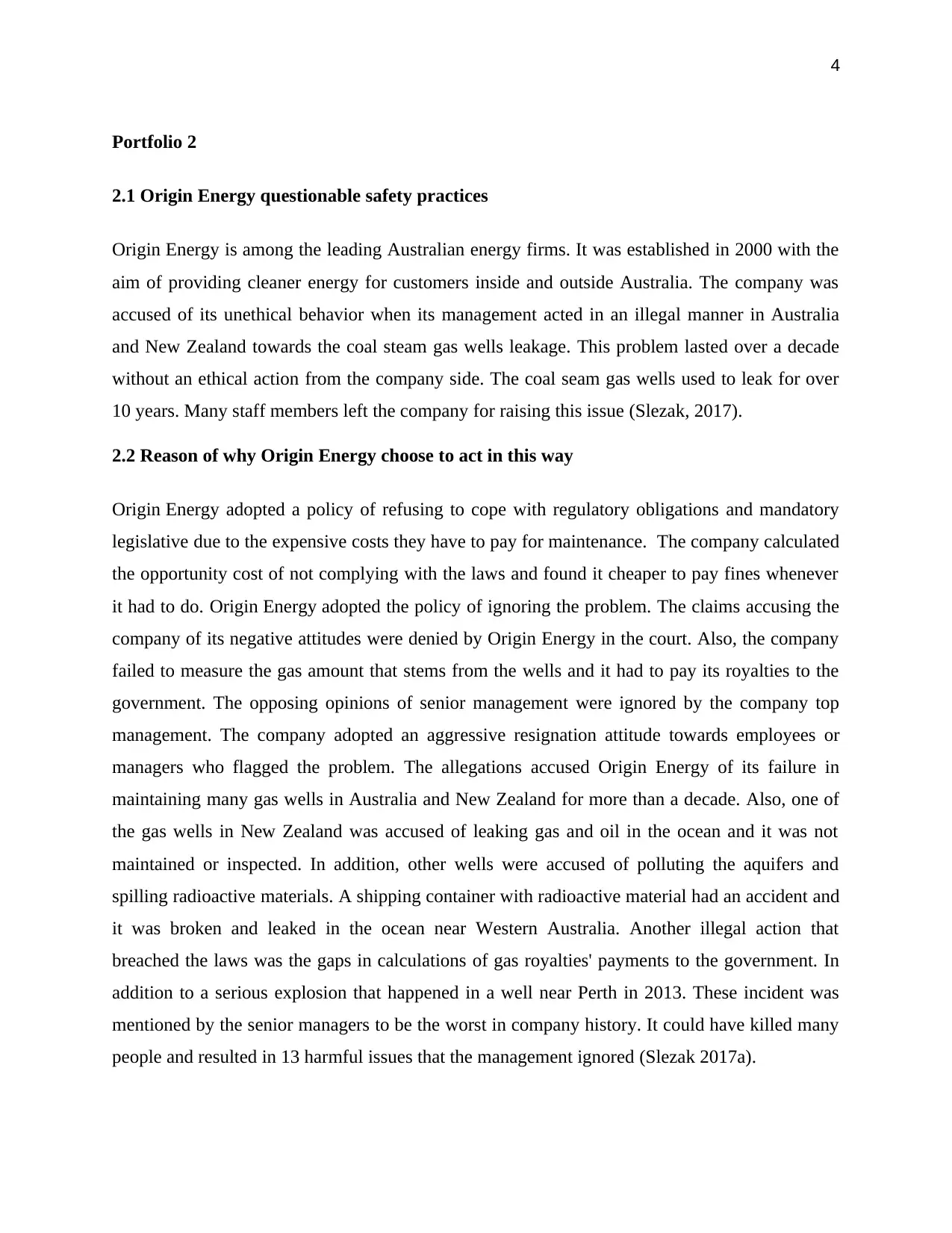
4
Portfolio 2
2.1 Origin Energy questionable safety practices
Origin Energy is among the leading Australian energy firms. It was established in 2000 with the
aim of providing cleaner energy for customers inside and outside Australia. The company was
accused of its unethical behavior when its management acted in an illegal manner in Australia
and New Zealand towards the coal steam gas wells leakage. This problem lasted over a decade
without an ethical action from the company side. The coal seam gas wells used to leak for over
10 years. Many staff members left the company for raising this issue (Slezak, 2017).
2.2 Reason of why Origin Energy choose to act in this way
Origin Energy adopted a policy of refusing to cope with regulatory obligations and mandatory
legislative due to the expensive costs they have to pay for maintenance. The company calculated
the opportunity cost of not complying with the laws and found it cheaper to pay fines whenever
it had to do. Origin Energy adopted the policy of ignoring the problem. The claims accusing the
company of its negative attitudes were denied by Origin Energy in the court. Also, the company
failed to measure the gas amount that stems from the wells and it had to pay its royalties to the
government. The opposing opinions of senior management were ignored by the company top
management. The company adopted an aggressive resignation attitude towards employees or
managers who flagged the problem. The allegations accused Origin Energy of its failure in
maintaining many gas wells in Australia and New Zealand for more than a decade. Also, one of
the gas wells in New Zealand was accused of leaking gas and oil in the ocean and it was not
maintained or inspected. In addition, other wells were accused of polluting the aquifers and
spilling radioactive materials. A shipping container with radioactive material had an accident and
it was broken and leaked in the ocean near Western Australia. Another illegal action that
breached the laws was the gaps in calculations of gas royalties' payments to the government. In
addition to a serious explosion that happened in a well near Perth in 2013. These incident was
mentioned by the senior managers to be the worst in company history. It could have killed many
people and resulted in 13 harmful issues that the management ignored (Slezak 2017a).
Portfolio 2
2.1 Origin Energy questionable safety practices
Origin Energy is among the leading Australian energy firms. It was established in 2000 with the
aim of providing cleaner energy for customers inside and outside Australia. The company was
accused of its unethical behavior when its management acted in an illegal manner in Australia
and New Zealand towards the coal steam gas wells leakage. This problem lasted over a decade
without an ethical action from the company side. The coal seam gas wells used to leak for over
10 years. Many staff members left the company for raising this issue (Slezak, 2017).
2.2 Reason of why Origin Energy choose to act in this way
Origin Energy adopted a policy of refusing to cope with regulatory obligations and mandatory
legislative due to the expensive costs they have to pay for maintenance. The company calculated
the opportunity cost of not complying with the laws and found it cheaper to pay fines whenever
it had to do. Origin Energy adopted the policy of ignoring the problem. The claims accusing the
company of its negative attitudes were denied by Origin Energy in the court. Also, the company
failed to measure the gas amount that stems from the wells and it had to pay its royalties to the
government. The opposing opinions of senior management were ignored by the company top
management. The company adopted an aggressive resignation attitude towards employees or
managers who flagged the problem. The allegations accused Origin Energy of its failure in
maintaining many gas wells in Australia and New Zealand for more than a decade. Also, one of
the gas wells in New Zealand was accused of leaking gas and oil in the ocean and it was not
maintained or inspected. In addition, other wells were accused of polluting the aquifers and
spilling radioactive materials. A shipping container with radioactive material had an accident and
it was broken and leaked in the ocean near Western Australia. Another illegal action that
breached the laws was the gaps in calculations of gas royalties' payments to the government. In
addition to a serious explosion that happened in a well near Perth in 2013. These incident was
mentioned by the senior managers to be the worst in company history. It could have killed many
people and resulted in 13 harmful issues that the management ignored (Slezak 2017a).
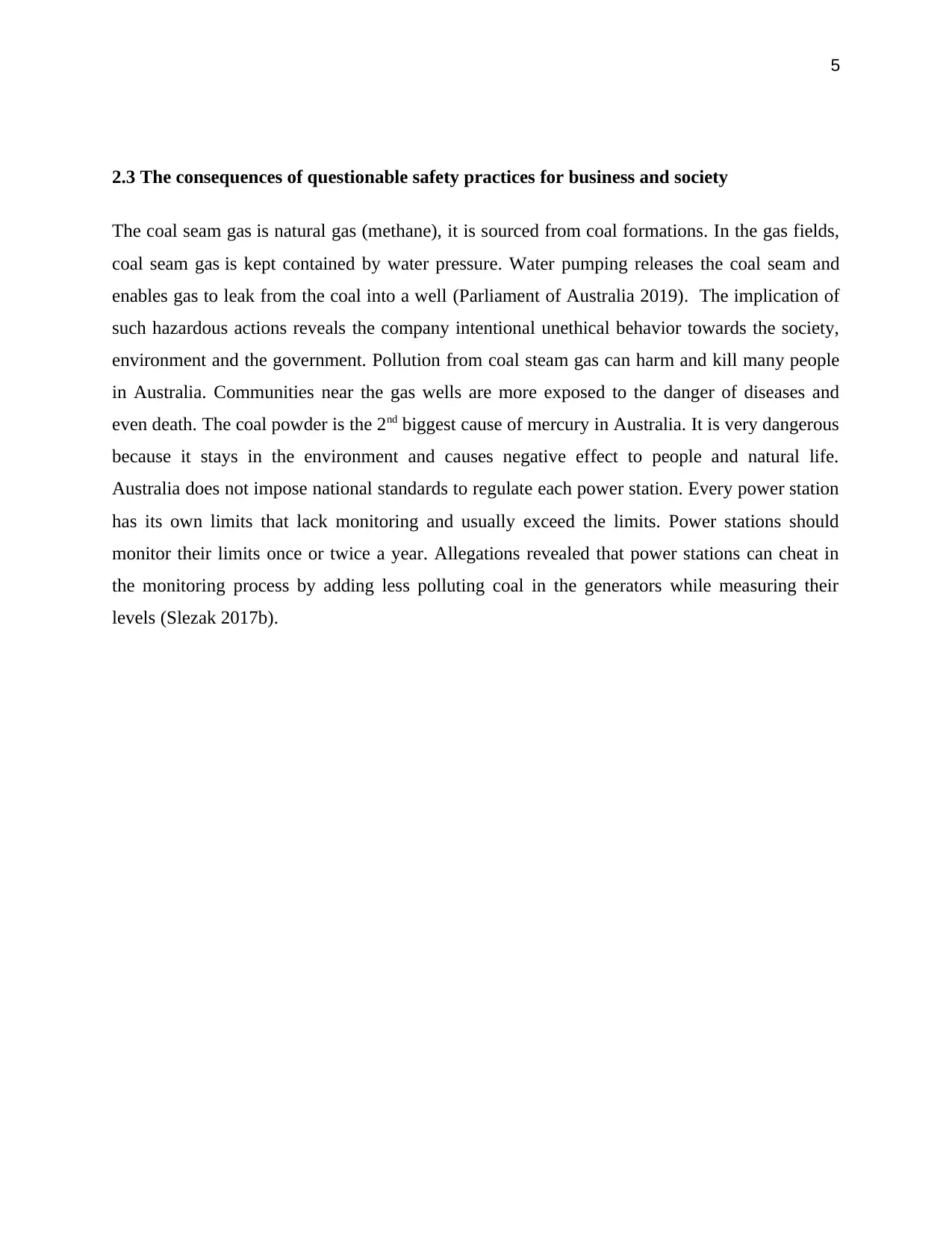
5
2.3 The consequences of questionable safety practices for business and society
The coal seam gas is natural gas (methane), it is sourced from coal formations. In the gas fields,
coal seam gas is kept contained by water pressure. Water pumping releases the coal seam and
enables gas to leak from the coal into a well (Parliament of Australia 2019). The implication of
such hazardous actions reveals the company intentional unethical behavior towards the society,
environment and the government. Pollution from coal steam gas can harm and kill many people
in Australia. Communities near the gas wells are more exposed to the danger of diseases and
even death. The coal powder is the 2nd biggest cause of mercury in Australia. It is very dangerous
because it stays in the environment and causes negative effect to people and natural life.
Australia does not impose national standards to regulate each power station. Every power station
has its own limits that lack monitoring and usually exceed the limits. Power stations should
monitor their limits once or twice a year. Allegations revealed that power stations can cheat in
the monitoring process by adding less polluting coal in the generators while measuring their
levels (Slezak 2017b).
2.3 The consequences of questionable safety practices for business and society
The coal seam gas is natural gas (methane), it is sourced from coal formations. In the gas fields,
coal seam gas is kept contained by water pressure. Water pumping releases the coal seam and
enables gas to leak from the coal into a well (Parliament of Australia 2019). The implication of
such hazardous actions reveals the company intentional unethical behavior towards the society,
environment and the government. Pollution from coal steam gas can harm and kill many people
in Australia. Communities near the gas wells are more exposed to the danger of diseases and
even death. The coal powder is the 2nd biggest cause of mercury in Australia. It is very dangerous
because it stays in the environment and causes negative effect to people and natural life.
Australia does not impose national standards to regulate each power station. Every power station
has its own limits that lack monitoring and usually exceed the limits. Power stations should
monitor their limits once or twice a year. Allegations revealed that power stations can cheat in
the monitoring process by adding less polluting coal in the generators while measuring their
levels (Slezak 2017b).
⊘ This is a preview!⊘
Do you want full access?
Subscribe today to unlock all pages.

Trusted by 1+ million students worldwide
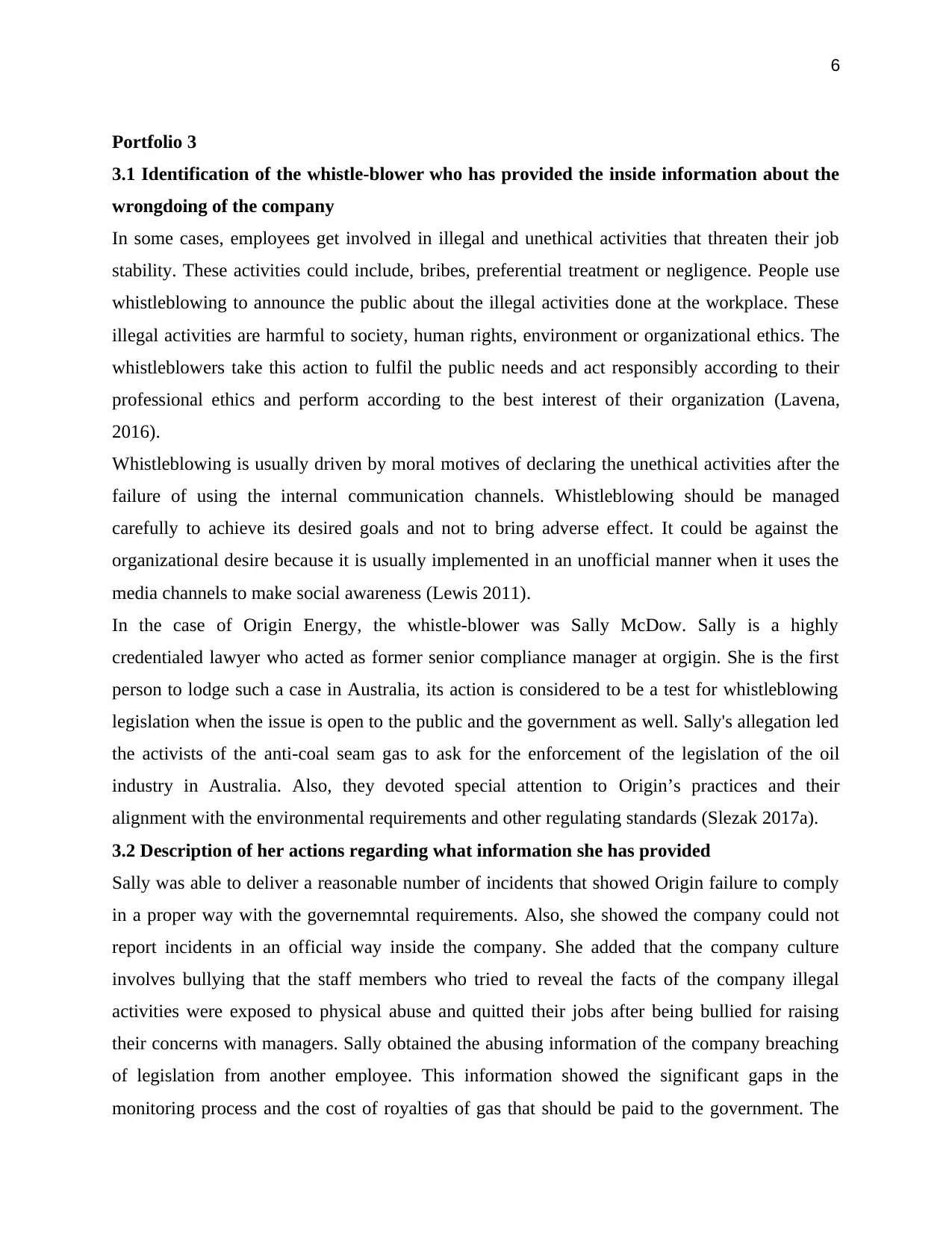
6
Portfolio 3
3.1 Identification of the whistle-blower who has provided the inside information about the
wrongdoing of the company
In some cases, employees get involved in illegal and unethical activities that threaten their job
stability. These activities could include, bribes, preferential treatment or negligence. People use
whistleblowing to announce the public about the illegal activities done at the workplace. These
illegal activities are harmful to society, human rights, environment or organizational ethics. The
whistleblowers take this action to fulfil the public needs and act responsibly according to their
professional ethics and perform according to the best interest of their organization (Lavena,
2016).
Whistleblowing is usually driven by moral motives of declaring the unethical activities after the
failure of using the internal communication channels. Whistleblowing should be managed
carefully to achieve its desired goals and not to bring adverse effect. It could be against the
organizational desire because it is usually implemented in an unofficial manner when it uses the
media channels to make social awareness (Lewis 2011).
In the case of Origin Energy, the whistle-blower was Sally McDow. Sally is a highly
credentialed lawyer who acted as former senior compliance manager at orgigin. She is the first
person to lodge such a case in Australia, its action is considered to be a test for whistleblowing
legislation when the issue is open to the public and the government as well. Sally's allegation led
the activists of the anti-coal seam gas to ask for the enforcement of the legislation of the oil
industry in Australia. Also, they devoted special attention to Origin’s practices and their
alignment with the environmental requirements and other regulating standards (Slezak 2017a).
3.2 Description of her actions regarding what information she has provided
Sally was able to deliver a reasonable number of incidents that showed Origin failure to comply
in a proper way with the governemntal requirements. Also, she showed the company could not
report incidents in an official way inside the company. She added that the company culture
involves bullying that the staff members who tried to reveal the facts of the company illegal
activities were exposed to physical abuse and quitted their jobs after being bullied for raising
their concerns with managers. Sally obtained the abusing information of the company breaching
of legislation from another employee. This information showed the significant gaps in the
monitoring process and the cost of royalties of gas that should be paid to the government. The
Portfolio 3
3.1 Identification of the whistle-blower who has provided the inside information about the
wrongdoing of the company
In some cases, employees get involved in illegal and unethical activities that threaten their job
stability. These activities could include, bribes, preferential treatment or negligence. People use
whistleblowing to announce the public about the illegal activities done at the workplace. These
illegal activities are harmful to society, human rights, environment or organizational ethics. The
whistleblowers take this action to fulfil the public needs and act responsibly according to their
professional ethics and perform according to the best interest of their organization (Lavena,
2016).
Whistleblowing is usually driven by moral motives of declaring the unethical activities after the
failure of using the internal communication channels. Whistleblowing should be managed
carefully to achieve its desired goals and not to bring adverse effect. It could be against the
organizational desire because it is usually implemented in an unofficial manner when it uses the
media channels to make social awareness (Lewis 2011).
In the case of Origin Energy, the whistle-blower was Sally McDow. Sally is a highly
credentialed lawyer who acted as former senior compliance manager at orgigin. She is the first
person to lodge such a case in Australia, its action is considered to be a test for whistleblowing
legislation when the issue is open to the public and the government as well. Sally's allegation led
the activists of the anti-coal seam gas to ask for the enforcement of the legislation of the oil
industry in Australia. Also, they devoted special attention to Origin’s practices and their
alignment with the environmental requirements and other regulating standards (Slezak 2017a).
3.2 Description of her actions regarding what information she has provided
Sally was able to deliver a reasonable number of incidents that showed Origin failure to comply
in a proper way with the governemntal requirements. Also, she showed the company could not
report incidents in an official way inside the company. She added that the company culture
involves bullying that the staff members who tried to reveal the facts of the company illegal
activities were exposed to physical abuse and quitted their jobs after being bullied for raising
their concerns with managers. Sally obtained the abusing information of the company breaching
of legislation from another employee. This information showed the significant gaps in the
monitoring process and the cost of royalties of gas that should be paid to the government. The
Paraphrase This Document
Need a fresh take? Get an instant paraphrase of this document with our AI Paraphraser
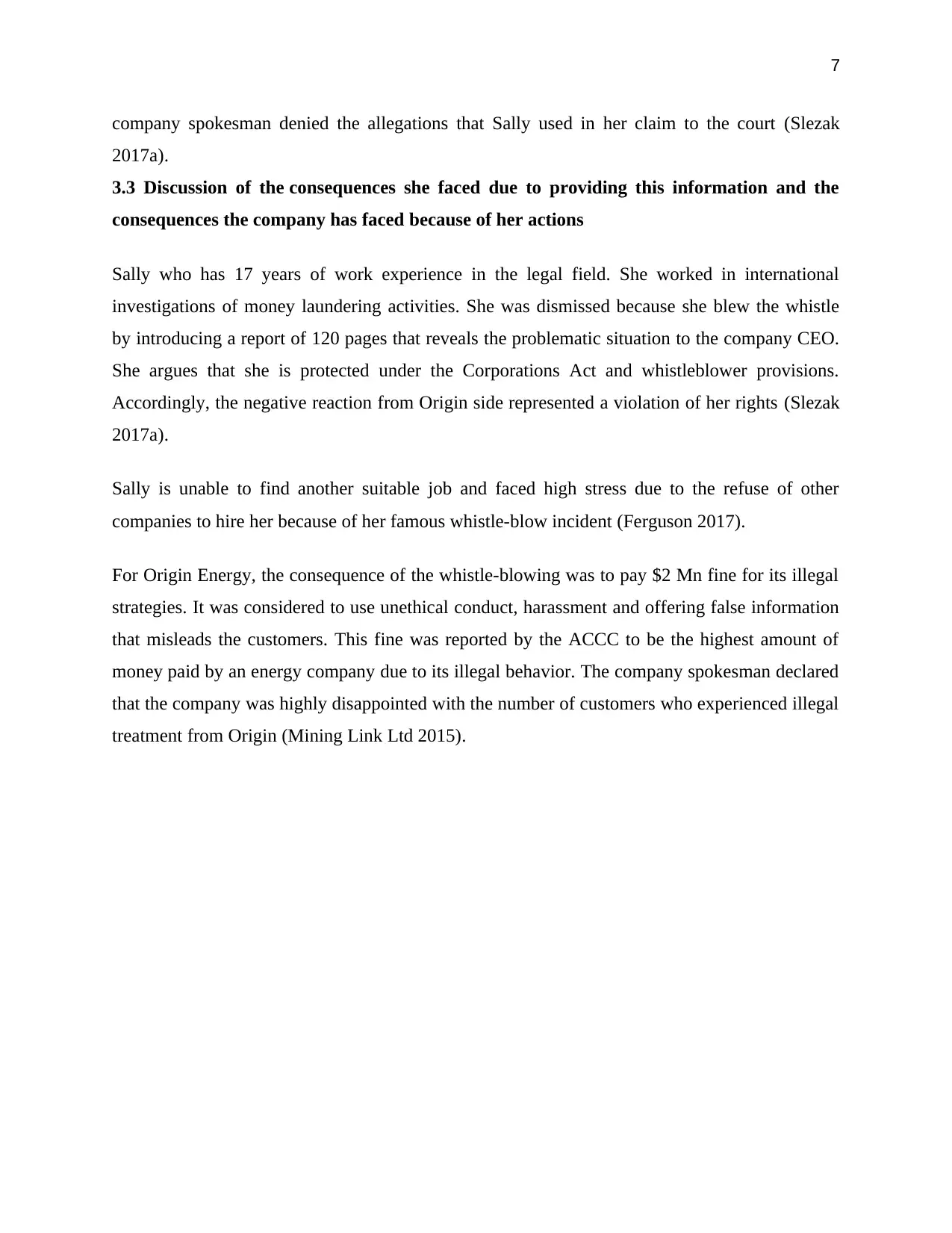
7
company spokesman denied the allegations that Sally used in her claim to the court (Slezak
2017a).
3.3 Discussion of the consequences she faced due to providing this information and the
consequences the company has faced because of her actions
Sally who has 17 years of work experience in the legal field. She worked in international
investigations of money laundering activities. She was dismissed because she blew the whistle
by introducing a report of 120 pages that reveals the problematic situation to the company CEO.
She argues that she is protected under the Corporations Act and whistleblower provisions.
Accordingly, the negative reaction from Origin side represented a violation of her rights (Slezak
2017a).
Sally is unable to find another suitable job and faced high stress due to the refuse of other
companies to hire her because of her famous whistle-blow incident (Ferguson 2017).
For Origin Energy, the consequence of the whistle-blowing was to pay $2 Mn fine for its illegal
strategies. It was considered to use unethical conduct, harassment and offering false information
that misleads the customers. This fine was reported by the ACCC to be the highest amount of
money paid by an energy company due to its illegal behavior. The company spokesman declared
that the company was highly disappointed with the number of customers who experienced illegal
treatment from Origin (Mining Link Ltd 2015).
company spokesman denied the allegations that Sally used in her claim to the court (Slezak
2017a).
3.3 Discussion of the consequences she faced due to providing this information and the
consequences the company has faced because of her actions
Sally who has 17 years of work experience in the legal field. She worked in international
investigations of money laundering activities. She was dismissed because she blew the whistle
by introducing a report of 120 pages that reveals the problematic situation to the company CEO.
She argues that she is protected under the Corporations Act and whistleblower provisions.
Accordingly, the negative reaction from Origin side represented a violation of her rights (Slezak
2017a).
Sally is unable to find another suitable job and faced high stress due to the refuse of other
companies to hire her because of her famous whistle-blow incident (Ferguson 2017).
For Origin Energy, the consequence of the whistle-blowing was to pay $2 Mn fine for its illegal
strategies. It was considered to use unethical conduct, harassment and offering false information
that misleads the customers. This fine was reported by the ACCC to be the highest amount of
money paid by an energy company due to its illegal behavior. The company spokesman declared
that the company was highly disappointed with the number of customers who experienced illegal
treatment from Origin (Mining Link Ltd 2015).
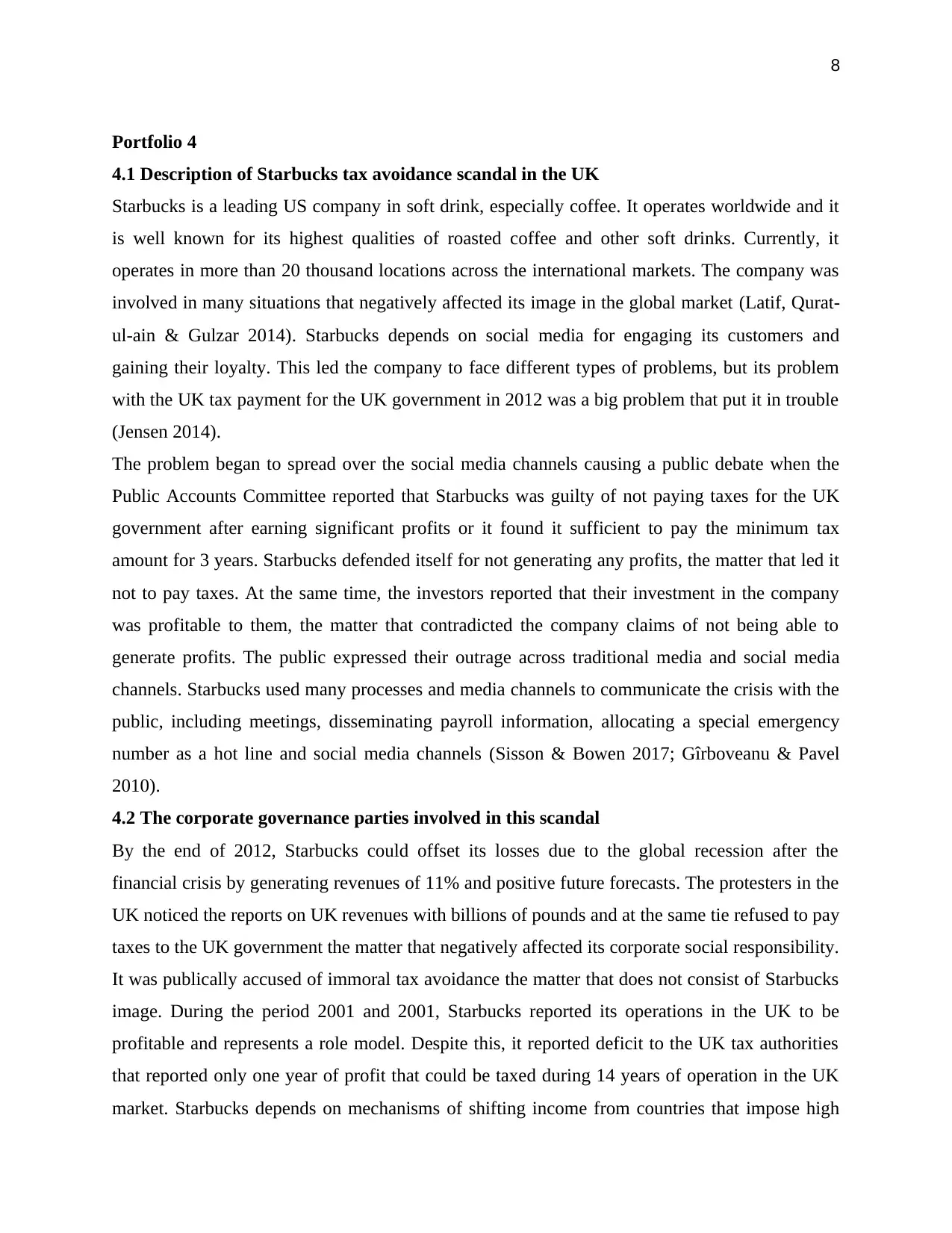
8
Portfolio 4
4.1 Description of Starbucks tax avoidance scandal in the UK
Starbucks is a leading US company in soft drink, especially coffee. It operates worldwide and it
is well known for its highest qualities of roasted coffee and other soft drinks. Currently, it
operates in more than 20 thousand locations across the international markets. The company was
involved in many situations that negatively affected its image in the global market (Latif, Qurat-
ul-ain & Gulzar 2014). Starbucks depends on social media for engaging its customers and
gaining their loyalty. This led the company to face different types of problems, but its problem
with the UK tax payment for the UK government in 2012 was a big problem that put it in trouble
(Jensen 2014).
The problem began to spread over the social media channels causing a public debate when the
Public Accounts Committee reported that Starbucks was guilty of not paying taxes for the UK
government after earning significant profits or it found it sufficient to pay the minimum tax
amount for 3 years. Starbucks defended itself for not generating any profits, the matter that led it
not to pay taxes. At the same time, the investors reported that their investment in the company
was profitable to them, the matter that contradicted the company claims of not being able to
generate profits. The public expressed their outrage across traditional media and social media
channels. Starbucks used many processes and media channels to communicate the crisis with the
public, including meetings, disseminating payroll information, allocating a special emergency
number as a hot line and social media channels (Sisson & Bowen 2017; Gîrboveanu & Pavel
2010).
4.2 The corporate governance parties involved in this scandal
By the end of 2012, Starbucks could offset its losses due to the global recession after the
financial crisis by generating revenues of 11% and positive future forecasts. The protesters in the
UK noticed the reports on UK revenues with billions of pounds and at the same tie refused to pay
taxes to the UK government the matter that negatively affected its corporate social responsibility.
It was publically accused of immoral tax avoidance the matter that does not consist of Starbucks
image. During the period 2001 and 2001, Starbucks reported its operations in the UK to be
profitable and represents a role model. Despite this, it reported deficit to the UK tax authorities
that reported only one year of profit that could be taxed during 14 years of operation in the UK
market. Starbucks depends on mechanisms of shifting income from countries that impose high
Portfolio 4
4.1 Description of Starbucks tax avoidance scandal in the UK
Starbucks is a leading US company in soft drink, especially coffee. It operates worldwide and it
is well known for its highest qualities of roasted coffee and other soft drinks. Currently, it
operates in more than 20 thousand locations across the international markets. The company was
involved in many situations that negatively affected its image in the global market (Latif, Qurat-
ul-ain & Gulzar 2014). Starbucks depends on social media for engaging its customers and
gaining their loyalty. This led the company to face different types of problems, but its problem
with the UK tax payment for the UK government in 2012 was a big problem that put it in trouble
(Jensen 2014).
The problem began to spread over the social media channels causing a public debate when the
Public Accounts Committee reported that Starbucks was guilty of not paying taxes for the UK
government after earning significant profits or it found it sufficient to pay the minimum tax
amount for 3 years. Starbucks defended itself for not generating any profits, the matter that led it
not to pay taxes. At the same time, the investors reported that their investment in the company
was profitable to them, the matter that contradicted the company claims of not being able to
generate profits. The public expressed their outrage across traditional media and social media
channels. Starbucks used many processes and media channels to communicate the crisis with the
public, including meetings, disseminating payroll information, allocating a special emergency
number as a hot line and social media channels (Sisson & Bowen 2017; Gîrboveanu & Pavel
2010).
4.2 The corporate governance parties involved in this scandal
By the end of 2012, Starbucks could offset its losses due to the global recession after the
financial crisis by generating revenues of 11% and positive future forecasts. The protesters in the
UK noticed the reports on UK revenues with billions of pounds and at the same tie refused to pay
taxes to the UK government the matter that negatively affected its corporate social responsibility.
It was publically accused of immoral tax avoidance the matter that does not consist of Starbucks
image. During the period 2001 and 2001, Starbucks reported its operations in the UK to be
profitable and represents a role model. Despite this, it reported deficit to the UK tax authorities
that reported only one year of profit that could be taxed during 14 years of operation in the UK
market. Starbucks depends on mechanisms of shifting income from countries that impose high
⊘ This is a preview!⊘
Do you want full access?
Subscribe today to unlock all pages.

Trusted by 1+ million students worldwide
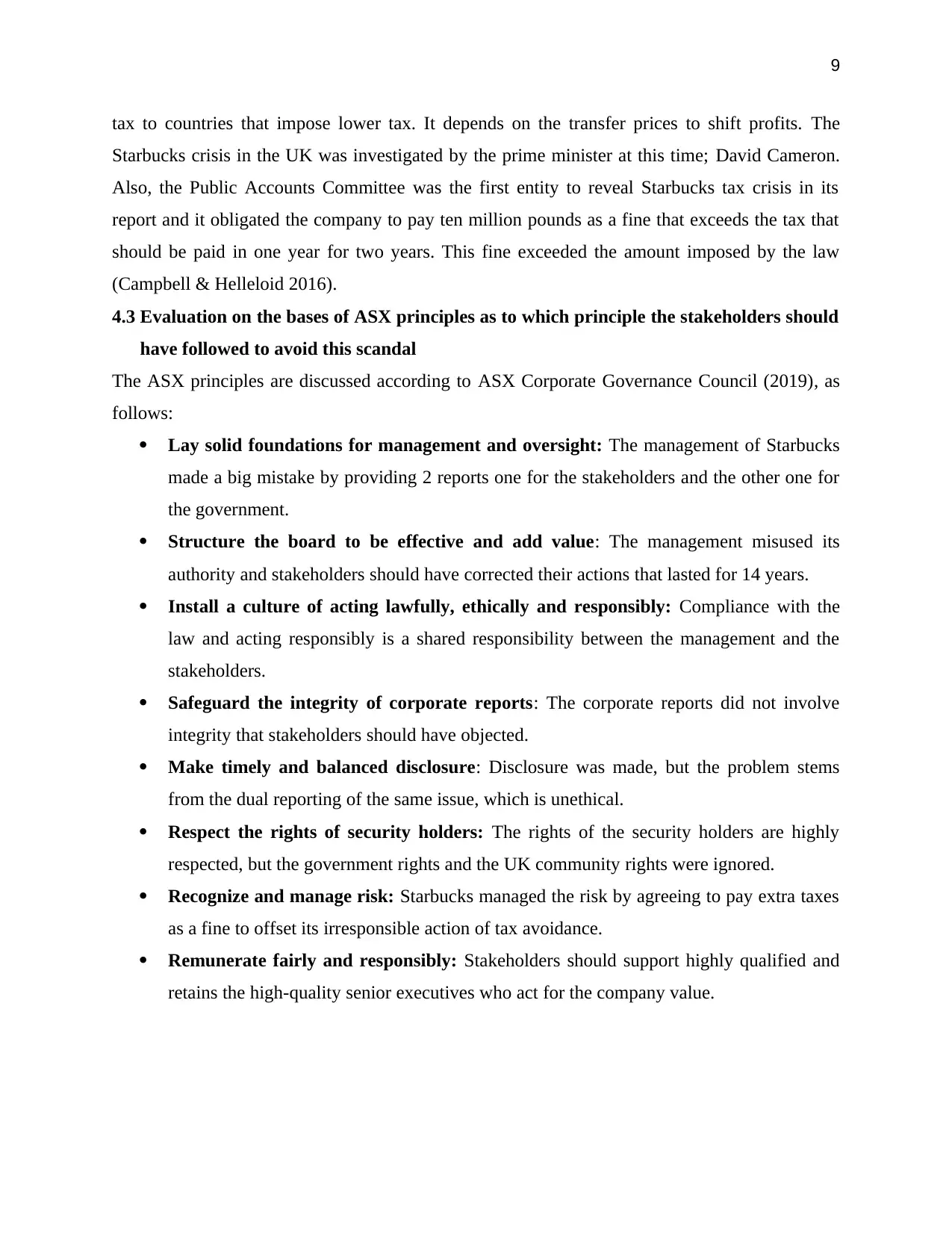
9
tax to countries that impose lower tax. It depends on the transfer prices to shift profits. The
Starbucks crisis in the UK was investigated by the prime minister at this time; David Cameron.
Also, the Public Accounts Committee was the first entity to reveal Starbucks tax crisis in its
report and it obligated the company to pay ten million pounds as a fine that exceeds the tax that
should be paid in one year for two years. This fine exceeded the amount imposed by the law
(Campbell & Helleloid 2016).
4.3 Evaluation on the bases of ASX principles as to which principle the stakeholders should
have followed to avoid this scandal
The ASX principles are discussed according to ASX Corporate Governance Council (2019), as
follows:
Lay solid foundations for management and oversight: The management of Starbucks
made a big mistake by providing 2 reports one for the stakeholders and the other one for
the government.
Structure the board to be effective and add value: The management misused its
authority and stakeholders should have corrected their actions that lasted for 14 years.
Install a culture of acting lawfully, ethically and responsibly: Compliance with the
law and acting responsibly is a shared responsibility between the management and the
stakeholders.
Safeguard the integrity of corporate reports: The corporate reports did not involve
integrity that stakeholders should have objected.
Make timely and balanced disclosure: Disclosure was made, but the problem stems
from the dual reporting of the same issue, which is unethical.
Respect the rights of security holders: The rights of the security holders are highly
respected, but the government rights and the UK community rights were ignored.
Recognize and manage risk: Starbucks managed the risk by agreeing to pay extra taxes
as a fine to offset its irresponsible action of tax avoidance.
Remunerate fairly and responsibly: Stakeholders should support highly qualified and
retains the high-quality senior executives who act for the company value.
tax to countries that impose lower tax. It depends on the transfer prices to shift profits. The
Starbucks crisis in the UK was investigated by the prime minister at this time; David Cameron.
Also, the Public Accounts Committee was the first entity to reveal Starbucks tax crisis in its
report and it obligated the company to pay ten million pounds as a fine that exceeds the tax that
should be paid in one year for two years. This fine exceeded the amount imposed by the law
(Campbell & Helleloid 2016).
4.3 Evaluation on the bases of ASX principles as to which principle the stakeholders should
have followed to avoid this scandal
The ASX principles are discussed according to ASX Corporate Governance Council (2019), as
follows:
Lay solid foundations for management and oversight: The management of Starbucks
made a big mistake by providing 2 reports one for the stakeholders and the other one for
the government.
Structure the board to be effective and add value: The management misused its
authority and stakeholders should have corrected their actions that lasted for 14 years.
Install a culture of acting lawfully, ethically and responsibly: Compliance with the
law and acting responsibly is a shared responsibility between the management and the
stakeholders.
Safeguard the integrity of corporate reports: The corporate reports did not involve
integrity that stakeholders should have objected.
Make timely and balanced disclosure: Disclosure was made, but the problem stems
from the dual reporting of the same issue, which is unethical.
Respect the rights of security holders: The rights of the security holders are highly
respected, but the government rights and the UK community rights were ignored.
Recognize and manage risk: Starbucks managed the risk by agreeing to pay extra taxes
as a fine to offset its irresponsible action of tax avoidance.
Remunerate fairly and responsibly: Stakeholders should support highly qualified and
retains the high-quality senior executives who act for the company value.
Paraphrase This Document
Need a fresh take? Get an instant paraphrase of this document with our AI Paraphraser
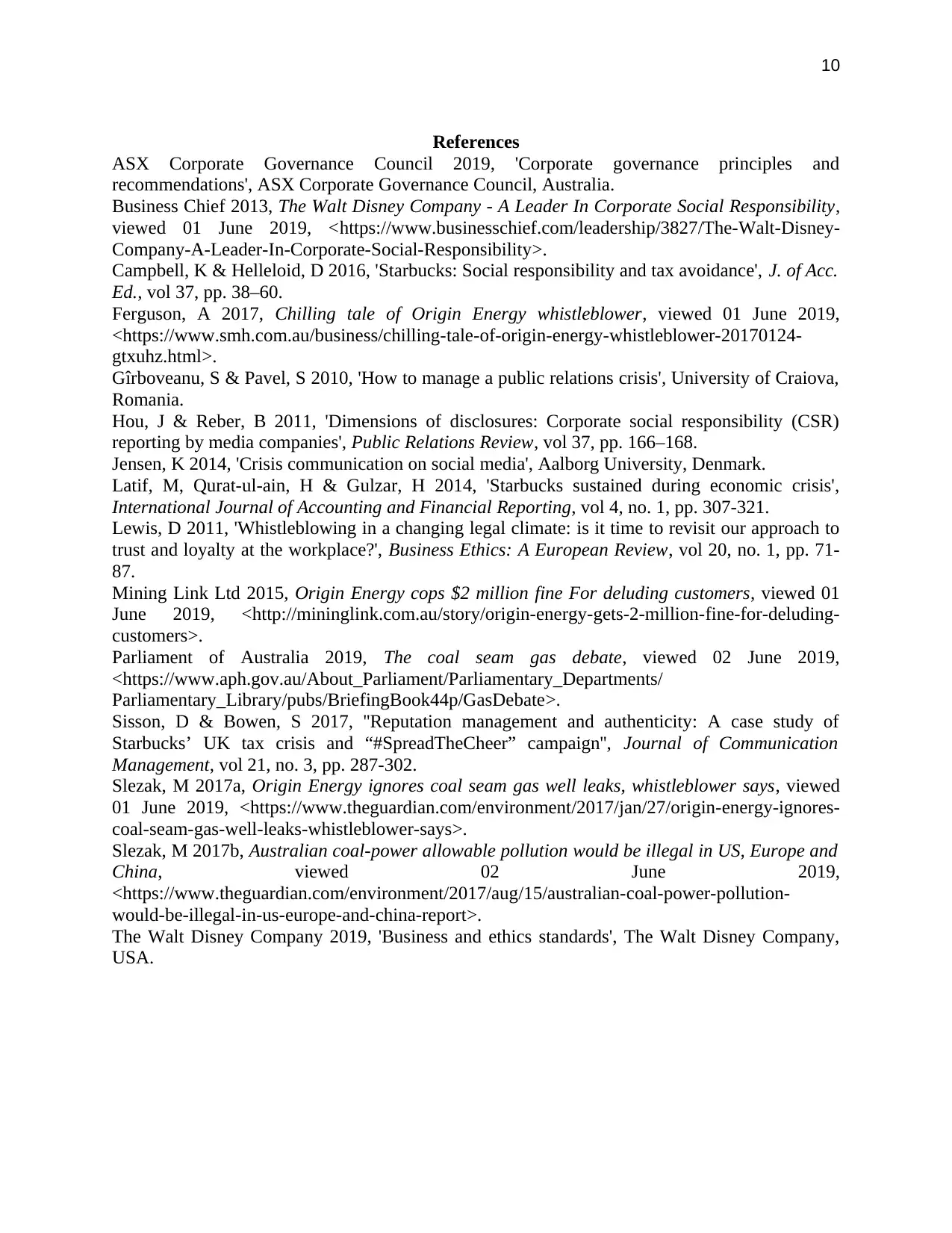
10
References
ASX Corporate Governance Council 2019, 'Corporate governance principles and
recommendations', ASX Corporate Governance Council, Australia.
Business Chief 2013, The Walt Disney Company - A Leader In Corporate Social Responsibility,
viewed 01 June 2019, <https://www.businesschief.com/leadership/3827/The-Walt-Disney-
Company-A-Leader-In-Corporate-Social-Responsibility>.
Campbell, K & Helleloid, D 2016, 'Starbucks: Social responsibility and tax avoidance', J. of Acc.
Ed., vol 37, pp. 38–60.
Ferguson, A 2017, Chilling tale of Origin Energy whistleblower, viewed 01 June 2019,
<https://www.smh.com.au/business/chilling-tale-of-origin-energy-whistleblower-20170124-
gtxuhz.html>.
Gîrboveanu, S & Pavel, S 2010, 'How to manage a public relations crisis', University of Craiova,
Romania.
Hou, J & Reber, B 2011, 'Dimensions of disclosures: Corporate social responsibility (CSR)
reporting by media companies', Public Relations Review, vol 37, pp. 166–168.
Jensen, K 2014, 'Crisis communication on social media', Aalborg University, Denmark.
Latif, M, Qurat-ul-ain, H & Gulzar, H 2014, 'Starbucks sustained during economic crisis',
International Journal of Accounting and Financial Reporting, vol 4, no. 1, pp. 307-321.
Lewis, D 2011, 'Whistleblowing in a changing legal climate: is it time to revisit our approach to
trust and loyalty at the workplace?', Business Ethics: A European Review, vol 20, no. 1, pp. 71-
87.
Mining Link Ltd 2015, Origin Energy cops $2 million fine For deluding customers, viewed 01
June 2019, <http://mininglink.com.au/story/origin-energy-gets-2-million-fine-for-deluding-
customers>.
Parliament of Australia 2019, The coal seam gas debate, viewed 02 June 2019,
<https://www.aph.gov.au/About_Parliament/Parliamentary_Departments/
Parliamentary_Library/pubs/BriefingBook44p/GasDebate>.
Sisson, D & Bowen, S 2017, ''Reputation management and authenticity: A case study of
Starbucks’ UK tax crisis and “#SpreadTheCheer” campaign'', Journal of Communication
Management, vol 21, no. 3, pp. 287-302.
Slezak, M 2017a, Origin Energy ignores coal seam gas well leaks, whistleblower says, viewed
01 June 2019, <https://www.theguardian.com/environment/2017/jan/27/origin-energy-ignores-
coal-seam-gas-well-leaks-whistleblower-says>.
Slezak, M 2017b, Australian coal-power allowable pollution would be illegal in US, Europe and
China, viewed 02 June 2019,
<https://www.theguardian.com/environment/2017/aug/15/australian-coal-power-pollution-
would-be-illegal-in-us-europe-and-china-report>.
The Walt Disney Company 2019, 'Business and ethics standards', The Walt Disney Company,
USA.
References
ASX Corporate Governance Council 2019, 'Corporate governance principles and
recommendations', ASX Corporate Governance Council, Australia.
Business Chief 2013, The Walt Disney Company - A Leader In Corporate Social Responsibility,
viewed 01 June 2019, <https://www.businesschief.com/leadership/3827/The-Walt-Disney-
Company-A-Leader-In-Corporate-Social-Responsibility>.
Campbell, K & Helleloid, D 2016, 'Starbucks: Social responsibility and tax avoidance', J. of Acc.
Ed., vol 37, pp. 38–60.
Ferguson, A 2017, Chilling tale of Origin Energy whistleblower, viewed 01 June 2019,
<https://www.smh.com.au/business/chilling-tale-of-origin-energy-whistleblower-20170124-
gtxuhz.html>.
Gîrboveanu, S & Pavel, S 2010, 'How to manage a public relations crisis', University of Craiova,
Romania.
Hou, J & Reber, B 2011, 'Dimensions of disclosures: Corporate social responsibility (CSR)
reporting by media companies', Public Relations Review, vol 37, pp. 166–168.
Jensen, K 2014, 'Crisis communication on social media', Aalborg University, Denmark.
Latif, M, Qurat-ul-ain, H & Gulzar, H 2014, 'Starbucks sustained during economic crisis',
International Journal of Accounting and Financial Reporting, vol 4, no. 1, pp. 307-321.
Lewis, D 2011, 'Whistleblowing in a changing legal climate: is it time to revisit our approach to
trust and loyalty at the workplace?', Business Ethics: A European Review, vol 20, no. 1, pp. 71-
87.
Mining Link Ltd 2015, Origin Energy cops $2 million fine For deluding customers, viewed 01
June 2019, <http://mininglink.com.au/story/origin-energy-gets-2-million-fine-for-deluding-
customers>.
Parliament of Australia 2019, The coal seam gas debate, viewed 02 June 2019,
<https://www.aph.gov.au/About_Parliament/Parliamentary_Departments/
Parliamentary_Library/pubs/BriefingBook44p/GasDebate>.
Sisson, D & Bowen, S 2017, ''Reputation management and authenticity: A case study of
Starbucks’ UK tax crisis and “#SpreadTheCheer” campaign'', Journal of Communication
Management, vol 21, no. 3, pp. 287-302.
Slezak, M 2017a, Origin Energy ignores coal seam gas well leaks, whistleblower says, viewed
01 June 2019, <https://www.theguardian.com/environment/2017/jan/27/origin-energy-ignores-
coal-seam-gas-well-leaks-whistleblower-says>.
Slezak, M 2017b, Australian coal-power allowable pollution would be illegal in US, Europe and
China, viewed 02 June 2019,
<https://www.theguardian.com/environment/2017/aug/15/australian-coal-power-pollution-
would-be-illegal-in-us-europe-and-china-report>.
The Walt Disney Company 2019, 'Business and ethics standards', The Walt Disney Company,
USA.
1 out of 11
Related Documents
Your All-in-One AI-Powered Toolkit for Academic Success.
+13062052269
info@desklib.com
Available 24*7 on WhatsApp / Email
![[object Object]](/_next/static/media/star-bottom.7253800d.svg)
Unlock your academic potential
Copyright © 2020–2026 A2Z Services. All Rights Reserved. Developed and managed by ZUCOL.





